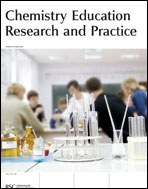DEVELOPING STUDENTS' UNDERSTANDING OF CHEMICAL CHANGE: WHAT SHOULD WE BE TEACHING?
Abstract
Research over the last two decades has revealed that students' understanding of chemical change is very poor - even amongst those that have successfully passed public examinations. This paper argues that the underlying problem is located with the specification of the chemistry curriculum. Kinds of problems are identified. In particular, the curriculum does not directly address key ideas that students do not have and need to develop in order to understand 'standard' chemistry content. They have been assumed and in this sense they are 'missing' from our teaching. Such ideas are identified and the results of an intervention with undergraduate students on an Initial Teacher Training course (students who will teach in UK primary schools where the pupils are aged 5 -11) which did seek to address them are reported. These students have not studied chemistry or physics at tertiary level (16-18), are predominantly female and arrive with negative attitudes towards science. Data was collected by a questionnaire administered at the start and again towards the end of a first year physical science subject knowledge module. The findings do not lead to a rejection of the hypothesis and, indeed, give grounds for optimism. [Chem. Educ. Res. Pract. Eur.: 2000, 1, 77-90]

 Please wait while we load your content...
Please wait while we load your content...